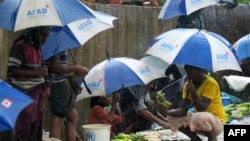The World Food Program has launched its biggest relief operation this year to aid thousands of Rohingya refugees whose possessions have been swept away in the torrential rains that hit Cox’s Bazaar in Bangladesh this week.
In the space of 24 hours, the WFP has delivered food to 16,000 Rohingya refugees who have lost everything in the heavy rains that have wreaked havoc in the camps. The agency reports it also has provided food aid to more than 800 people from the host community displaced by the flooding.
Bangladesh is a low-lying country prone to flooding during the monsoon season, which is set to last until October. However, the amount of rain that battered the region in just one day this week is by any measure extreme and devastating.
WFP spokesman Herve Verhoosel told VOA a colleague on the ground has described the depth of grief experienced by families who have lost the few belongings they have managed to acquire in the camps. More than 700,000 Rohingya refugees have fled violence and persecution in Myanmar since August 2017, many with nothing more than the clothes on their backs.
Citing one family as an example, Verhoosel described the refugees’ predicament as dire.
“The family lost everything because all that was in the house was basically washed away, what they used as a bed or what they used to cook. Everything was basically lost. They have nothing to cook [with]. They have nothing to sleep [on]. Most of their clothes have been lost. Basically, the little things that they have rebuilt since they arrived in the camp was lost in one night of rain,” he said.
Monsoons and downpours in Bangladesh have become more erratic and powerful due to climate change. Verhoosel says the WFP has been working with the refugees and host communities on disaster risk-reduction measures to mitigate the impact of climate-related events.
Fearing the worst, he said the WFP had pre-positioned food stocks at strategic locations around the camps before the monsoon season began. In doing so, he said, the agency was able to respond quickly to the current emergency.





